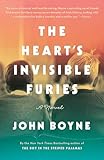Review: The Heart's Invisible Furies

Before I begin to describe The Heart’s Invisible Furies with abundant spoilers, let me say two things. Despite what I describe below, the book is very funny, as Cyril recounts his frequent fuckups. You would never know, from reading the back cover or the excerpted reviews inside, that Cyril is gay. Yet Cyril’s sexuality is the central theme of the book. I can only assume that this is a marketing decision, with which I strongly disagree.
16-year-old Catherine is forced out of her Cork village by the parish priest, when her pregnancy is discovered. It’s impossible to be a single, unwed mother in Ireland in 1945, so she puts her son up for adoption. Cyril Avery grows up in an odd, well-off household in Dublin, always being told by his adoptive father that he’s not a real Avery. At seven, he develops a fascination with Julian, the son of his father’s lawyer, whom he meets one fateful day. They meet again at fourteen, sharing a room in boarding school, and Cyril develops a full-blown but entirely secret obsession with the golden boy, Julian.
Cyril begins to realize that he is that most despised creature, a homosexual in 1950s Catholic Ireland. By twenty-one, he is frequently meeting other men for furtive, anonymous sex. There is no outlet for romance or love, just hurried encounters. Homosexual acts are illegal in Ireland and discovery would mean social and professional ruin, perhaps even prosecution. He’s still secretly in love with Julian, now a heterosexual hedonist in the swinging Sixties. At twenty-eight, deeply conflicted, he marries Julian’s sister Alice, and abandons her hours after the wedding. Of all the stupid things that Cyril does, this is the worst. By thirty-five (1980), he’s ended up in Amsterdam, where gay people can live openly, and he’s in a relationship with Bastiaan, a Dutch doctor. In 1987, Bastiaan and Cyril are in New York, working with dying AIDS patients. Fear of AIDS is rampant and many of them have been rejected by their families. One of these patients is Julian, who is determined that no-one in Ireland should know that he’s dying of such a shameful disease. From Julian, Cyril belatedly learns that Alice has a teenaged son, Liam. Julian insists that Cyril should have told him long ago, that he would have understood. Cyril knows better. Cyril couldn’t be honest with the world for a long time, because the world—and Ireland—wouldn’t let him be honest about himself. The episode ends with Bastiaan being killed by fagbashers who leave Cyril in a coma.
After that, Cyril returns to Dublin, where he lives openly if quietly as a gay man. In time, he is reunited with his mother Catherine and makes peace with Alice and Liam. The final episode takes place in 2015, months after Ireland voted to legalize same-sex marriage. Cyril, now seventy, wonders at the New Ireland and he marvels at his own 17-year-old grandson openly expressing affection for his boyfriend. It’s a bittersweet moment for Cyril. He thinks about Senator David Norris, Ireland’s most famous gay rights campaigner for forty years, saying, when asked if he would take advantage of the new law, “It’s a little bit late for me … I’ve spent so much time pushing the boat out that I forgot to jump on and now it’s out beyond the harbour on the high seas, but it’s very nice to look at.”
In a somewhat bitter afterword, the author John Boyne describes writing the book. He knew from a young age that he was gay, long before he knew what “gay” meant. Boyne drew upon his own early experiences in creating Cyril and regrets the potential that is lost to our generation. Boyne was born in Dublin in 1971, six years after me. I realized in my mid-teens that I am bisexual, something that I kept entirely buried for a decade. I found Ireland no more accepting than John Boyne did in the 1980s. If I were thirteen years old now in Dublin, instead of being thirteen in 1978, I wonder how things would be turning out for me. Would coming out as a bisexual teen be a near non-event, instead of the long-deferred and fearful-but-exhilarating landmark of my twenties? My mother gave me this book, after reading it herself, so I think it would be easier this time around.